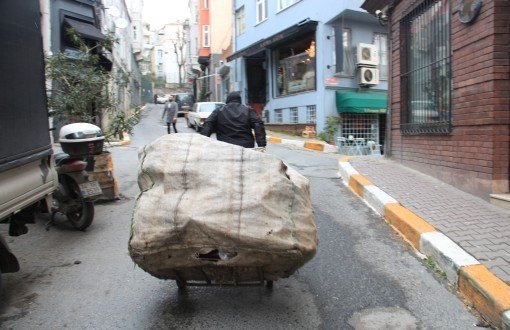A waste picker in Beyoğlu, İstanbul (Photo: bianet/File)
Newly introduced legal regulations for informal recycling workers in Türkiye are insufficient and might result in rights violations, a new report from the Deep Poverty Network and the Recycling Workers Association indicates.
Recyclable waste collectors are a common sight in the country's urban centers, dragging their large hand carts and sifting through trash bins for plastic and paper. The collected materials are sold to private recycling companies or directly to factories.
Türkiye's estimated 500,000 waste pickers primarily come from marginalized communities, such as internally displaced Kurdish farmers, members of the Roma community, and more recently, refugees. In the absence of formal employment opportunities, the informal recycling sector became a means of survival for those falling through the cracks.
Yet, their legal status does not make their work any less indispensable, as they are responsible for around 80 percent of the recycling in a country that already has one of the lowest recycling rates in Europe, leaving only Malta and Montenegro behind.
Legal status of waste pickers
Despite their crucial role in Türkiye's efforts to reach its environmental goals, waste pickers' legal position remains frail. In 2004, The government introduced new waste management regulations to realign its state laws with EU legislation.
With these new regulations, the status of waste pickers turned from informal to illegal, as the collection of recyclables fell into the hands of private companies. These licensed recycling firms, however, did not have enough employees or vehicles at their disposal to effectively manage the country's recycling. The waste pickers filled this gap by toiling for meager pay without proper labor protections.
Their modus operandi consists of selling their collected materials to unaccredited warehouses, which in turn sell the recyclables to licensed firms. These warehouses, often doubling as shelters for the waste pickers, are regularly subject to searches carried out by local authorities.
In the summer of 2021, in an informal waste facility in Bahçelievler, İstanbul, 241 people were apprehended, 196 of whom were refugees, mainly from Afghanistan. The refugees were subsequently sent to a repatriation center to be deported.
Besides the regular raids, authorities actually have been working on a series of to improve the waste pickers' conditions. A new circular introduced in June this year makes it possible for informal street collectors to be registered within the "zero waste information system," through the distribution of "Independent Zero Waste Collector Cards".
To obtain such a card, waste collectors must apply to their local municipality with their Turkish ID number. The municipality, in turn, provides materials such as gloves, clothes, and waste collection vehicles to the workers.
New legislation exacerbates problems
There is a catch, however, those who get an "Independent Zero Waste Collector's Card" can gather waste solely in their registered districts and must deliver their recyclable waste to licensed waste processing facilities or the municipalities' recyclable waste transfer centers.
"I collect waste from everywhere, I am not fixed at one location. With my own hand cart, I start from Nişantepe and go all the way to Ataşehir, Ümraniye, and Sancaktepe," a waste collector in İstanbul explains.
"If I can't find anything there, I have to go to other districts. Now if this circular comes into effect, I won't be able to get out of here. I won't be able to collect anything, I won't be able to support my household."
Ali Mendillioğlu, chair of the Recycling Workers Association, which advocates for waste pickers' rights, points out several other issues with the new circular, such as most waste pickers not having an official address and therefore being unable to obtain 'Independent Zero Waste Collector Card.'
Furthermore, the regulations lack salary and social security benefits provisions, despite these recycling workers providing public services, the association's chair underscores. Additionally, the closure of unaccredited warehouses exacerbates the existing problems.
"The removal of warehouses by municipalities and the establishment of intermediate transfer stations are also a problem," he explains, adding that removing warehouses also means removing people's shelters.
"Most of the recycling workers live in these warehouses. Collectors don't have a home anyway; if they pay rent, they will not earn anything," he continues.
"There is nothing ideal about this job"
Mendillioğlu neither desires to uphold the present state nor perceives it as fair; however, they find themselves unable to identify an alternative resolution.
"There is nothing ideal about this job. Waste picking cannot be transformed into an ideal form. This job can only exist where there is no ideal."
The Deep Poverty Network also has second thoughts about the newly implemented regulation. In a recent report, the organization asserts that this change in policy has led to heightened vulnerability for recycling workers and effectively criminalizes waste collection. Individuals possessing a 'Zero Waste Collector' card can now be subjected to police stops under the pretext of "ensuring security."
"Instead of punitive policies for those living in poverty, policies to prevent poverty should be developed," the organization argues.( WM/VK)






.jpg)






.jpg)
.jpg)
.jpg)
.jpg)
.jpg)